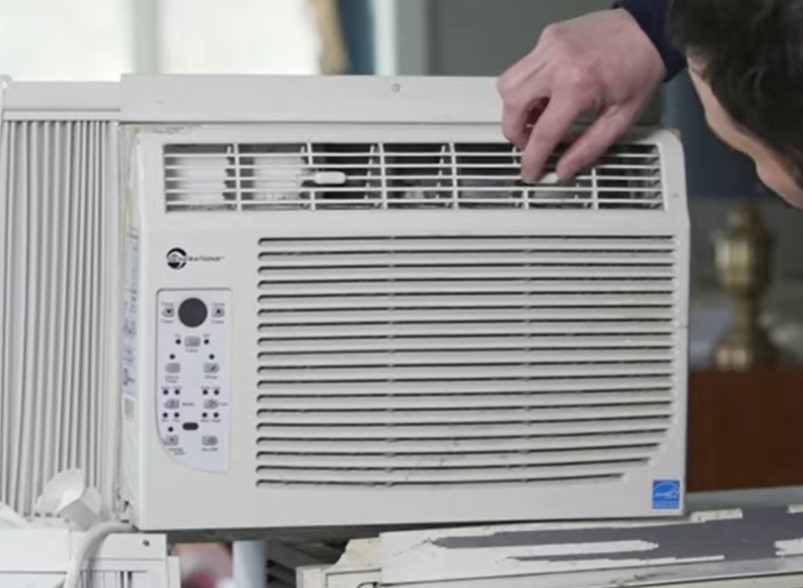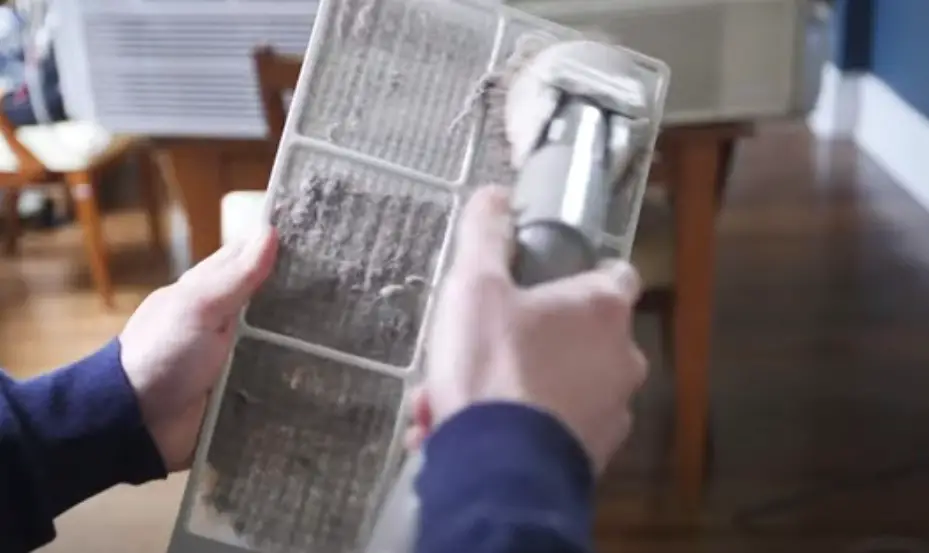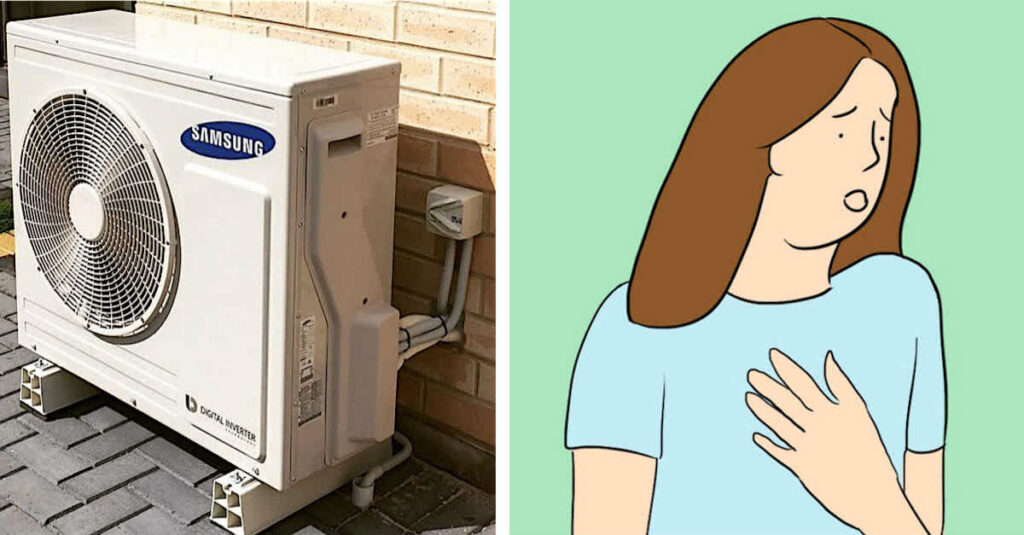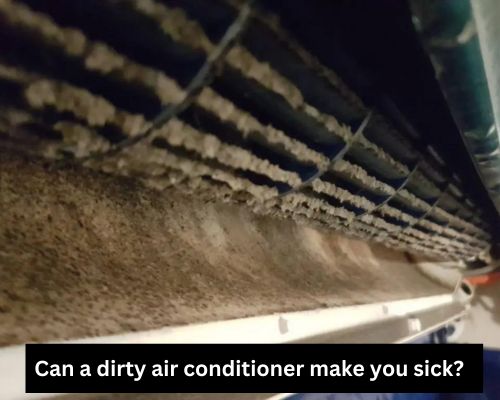Can you get sick from a window air conditioner?
Yes, it is possible to get sick from a window air conditioner under certain circumstances.
While window air conditioners are a popular and cost-effective option, there are concerns about their potential impact on our health.
There are several factors that contribute to this concern, including the potential for mold and bacteria to grow inside the unit, as well as the circulation of allergens and other particles in the air. Additionally, improperly maintained or installed air conditioning units can contribute to poor indoor air quality, which can lead to a range of health issues like headaches, fatigue, and respiratory problems.
In this blog post, we aim to answer this question and provide you with all the information you need to make an informed decision about your air conditioning needs.

Can Air Conditioning Make You Sick? Reveal the Truth
Yes! While air conditioning provides a comfortable indoor environment, it can also cause health issues when not maintained properly. Dirty or poorly maintained AC units can circulate allergens, bacteria, and viruses, leading to respiratory problems, allergies, and other illnesses.
Air conditioning can also dry out the air, causing dry skin, eyes, and throat, which can lead to dehydration and respiratory infections. Additionally, sudden changes in temperature caused by AC can cause headaches and sinus problems.
Therefore, it is essential to regularly clean and maintain your AC system and keep it in proper working condition to prevent it from making you sick.

Can You Get Sick from a Window Air Conditioner? The Causes are Explained
Yes, you can get sick from a window air conditioner too. While window air conditioners themselves do not directly cause illness, they can contribute to health issues if not properly maintained or used in certain situations.
Here are some factors to consider:
Poor air quality: If the air conditioner’s filters are not cleaned or replaced regularly, dust, pollen, and other allergens can accumulate, leading to poor indoor air quality. Breathing in such contaminants can trigger allergies, respiratory problems, or worsen existing conditions.
Mold and bacteria growth: If the air conditioner is not cleaned and maintained adequately, moisture can build up inside the unit. This moisture, combined with the dark and cool environment, creates an ideal breeding ground for mold and bacteria. When the air conditioner is turned on, these microorganisms can be circulated into the room, potentially causing respiratory issues or allergic reactions.
Contaminated outdoor air: If the window air conditioner draws in air from outside, it can bring in pollutants, such as smoke, exhaust fumes, or allergens. If you live in an area with poor air quality, using the air conditioner without appropriate air filtration can lead to respiratory problems.
Temperature fluctuations: Rapid changes in temperature caused by an air conditioner can potentially stress the body’s immune system. Going from a hot outdoor environment to a significantly cooler indoor temperature may make some individuals more susceptible to respiratory infections or cold-like symptoms.
To minimize the risk of getting sick from a window air conditioner, it is essential to clean and maintain the unit regularly. This includes cleaning or replacing the filters, checking for and removing any mold or mildew growth, and ensuring proper ventilation.
Additionally, using air purifiers or opening windows to improve ventilation can help reduce indoor air pollution. If you have pre-existing respiratory conditions or allergies, it is advisable to consult a healthcare professional for personalized advice.

How Do I Stop My Window AC from Making Me Sick?
You’re sitting in your home, enjoying the cool air from your window air conditioner, when suddenly you start to feel sick. Could the two be related? It’s possible.
While it may seem counterintuitive, you can actually get sick from a window air conditioner. Here’s how it works: Window air conditioners are a breeding ground for mold and bacteria.
When these contaminants build up, they can be released into the air, causing respiratory problems, headaches, and other symptoms of ill health. Additionally, if the unit is not properly maintained, it can become a source of carbon monoxide poisoning. So what can you do to protect yourself?
Steps to alleviate the issue are:
- Firstly, make sure that the filter is clean and free from any debris. Dirty filters can cause the unit to circulate allergens and bacteria throughout the room.
- Additionally, it may be helpful to use an air purifier in conjunction with your AC unit to further reduce the presence of harmful particles.
- It is also important to keep your AC unit well-maintained and serviced regularly to ensure that it is functioning properly.
- Finally, if you are experiencing persistent symptoms, it may be worth consulting with a healthcare professional to rule out any underlying health conditions.
If you start to experience any symptoms of illness while using your AC unit, as an immediate treatment, open a window or door to get some fresh air immediately and see a doctor if the symptoms persist.
Air Conditioning Sickness Symptoms
If you’re someone who suffers from allergies, asthma, or other respiratory problems, you may be especially susceptible to air conditioning sickness symptoms. These can include a runny nose, congestion, headaches, itchy eyes, and even difficulty breathing. If you’re experiencing any of these symptoms after being in an air-conditioned space for a while, it’s important to see a doctor to rule out more serious causes.
In the meantime, there are some things you can do to try to alleviate your symptoms. First, if possible, try to avoid being in air-conditioned spaces for long periods of time. If you have to be in one (like at work or school), take breaks outside in the fresh air as often as possible.
This will help keep your lungs and sinuses from getting too dried out. Second, drink plenty of fluids throughout the day – this helps keep your mucous membranes moist and less likely to irritate your respiratory system. And third, use a saline nasal spray or gel before going into an air-conditioned space – this can help prevent dryness and irritation of the nasal passages.

Can You Get a Cold from Air Conditioning
If you’re wondering whether you can catch a cold from your air conditioner, the answer is yes – but it’s not as simple as that. While air conditioning can circulate viruses and bacteria, there are other factors at play when it comes to getting sick. Here’s what you need to know about catching a cold from your AC unit.
How Air Conditioning Can Make You Sick When viruses and bacteria circulate through an air conditioner, they can become airborne and end up in your nose, mouth, or eyes. From there, they can enter your body and make you sick.
This is why it’s important to clean your AC unit regularly – if it’s full of dirt and grime, it will be more likely to circulate illness-causing germs. There are other ways that air conditioning can contribute to making you sick, too. If the temperature in your home is set too low, your body may have a tough time regulating its internal temperature.
This can make you more susceptible to sickness because your immune system isn’t operating at its best.
Additionally, dry air circulated by an AC unit can dehydrate you, which also weakens your immunity. So while air conditioning itself doesn’t cause colds or the flu, it can create an environment that makes it easier for these illnesses to spread – especially if someone in your household is already sick.
Tips for Staying Healthy When Using Air Conditioning
Air Conditioning Sickness Symptoms Treatment
When the temperatures outside rise, many people turn to their air conditioners for relief. But did you know that air conditioning can actually make some people sick? It’s true!
A small percentage of the population is susceptible to what’s called “air conditioning sickness.” Symptoms of air conditioning sickness include headaches, nausea, and fatigue. These symptoms are caused by a decrease in humidity levels, which can happen when air conditioners are used.
The lack of moisture in the air can cause dehydration, which can lead to headaches and other symptoms. If you think you might be suffering from air conditioning sickness, there are a few things you can do to find relief. First, try increasing the humidity in your home or office by using a humidifier.
You can also drink plenty of fluids and dress in light clothing to stay cool and avoid dehydration. If these measures don’t help, see your doctor for additional treatment options.
Can a dirty air conditioner make you sick?
Yes, a dirty air conditioner can make you sick. When an air conditioner is dirty, it can accumulate dust, dirt, mold, and other allergens. When these particles are circulated into the air, they can irritate your respiratory system and trigger allergies or respiratory problems such as coughing, sneezing, congestion, or even asthma attacks.

It is important to regularly clean and maintain your air conditioner to ensure clean and healthy air quality in your living or working environment.
Do Window Air Conditioners Cause Cancer?
While there is no definitive answer to this question, some experts believe that window air conditioners may indeed cause cancer. The reason for this is that many window air conditioners contain Freon, which is a known carcinogen.
Additionally, when window air conditioners are used, they release ozone into the air, which has also been linked to cancer.
So, while there is no concrete evidence that window air conditioners cause cancer, there are some potential risks associated with their use. If you’re concerned about these risks, it might be best to avoid using a window air conditioner in your home.
Can your air conditioner make you sick? The Signs to look out for
FAQs on Can You Get Sick from a Window Air Conditioner
Do Window Ac Units Make You Sick?
If you’re concerned that your window air conditioner might be making you sick, you’re not alone. While the jury is still out on whether or not window AC units can actually make you sick, there are a few things to consider that might help put your mind at ease.
For starters, it’s important to make sure that your AC unit is properly installed and maintained.
If there are any gaps around the unit, it’s possible for outside air (and contaminants) to seep in. Additionally, be sure to clean or replace the filter on a regular basis – a dirty filter can circulate dust and other allergens throughout your home.
Another thing to keep in mind is that window AC units tend to cool the room quickly and efficiently – but this can also lead to condensation on walls and surfaces which can provide an ideal breeding ground for mold spores.
If you notice any mold growth in or around your AC unit, be sure to clean it up immediately and take steps to prevent future growth (like opening a window or using a dehumidifier).
So, while there’s no definitive answer as to whether or not window AC units can make you sick, there are certainly some precautions you can take to minimize your risk. If you have any concerns about your health after using a window AC unit, be sure to speak with your doctor.
Can Window Ac Mold Make You Sick?
Yes, window AC mold can make you sick. In fact, mold is one of the most common indoor air contaminants and can cause a variety of health problems, including respiratory infections, allergic reactions, and asthma attacks. Mold thrives in damp, humid environments and can grow on nearly any surface, including the evaporator coils of your window AC unit.
If left unchecked, mold can quickly spread throughout your home and potentially make your family members very ill. If you suspect that your window AC unit has developed mold growth, it’s important to take immediate action. First, turn off the unit and unplug it from the wall outlet.
Next, remove the front panel of the unit so that you can access the coils. Thoroughly clean the coils with a solution of bleach and water (1 part bleach to 10 parts water) using a soft brush or cloth. Once the coils are clean, dry them completely before reassembling the unit.
Finally, run the unit on its highest setting for at least 30 minutes to help circulate fresh air throughout your home and reduce moisture levels. If you have any concerns about mold growth in your home or office, be sure to contact a professional mold remediation company for further assistance.
What Sickness Can You Get from Air Conditioning?
You can get sick from air conditioning by developing a condition called “sick building syndrome.” This happens when you’re exposed to high levels of contaminants in the air, such as mold, bacteria, and viruses. The symptoms of sick building syndrome include headaches, dizziness, nausea, and fatigue.
If you think you might have sick building syndrome, see your doctor for a diagnosis.
How Do You Know If Ac is Making You Sick?
If you’re feeling sick and think it might be due to your air conditioner, there are a few things to consider. First, have you developed any new allergies or sensitivities since using the AC? If so, it’s possible that you’re reacting to something in the air that the AC is circulating.
Another possibility is that you’re experiencing what’s known as “sick building syndrome.” This happens when people spend a lot of time in a poorly ventilated space and start to experience symptoms like headaches, nausea, and fatigue. If you suspect sick building syndrome, try opening windows or doors to improve ventilation.
If that doesn’t help, you may need to leave the building for a while to get some fresh air.
It’s also possible that your AC unit itself is making you sick. If it isn’t properly maintained, it can become a breeding ground for mold and bacteria.
These can cause respiratory problems, so if you notice musty odors coming from your AC unit, have it checked out by a professional.
In general, if you start feeling sick after using a new AC unit or after spending extended periods of time in one place with the AC on, pay attention to your symptoms and see if they improve when you leave the area or turn off the AC. If they do, it’s likely that the AC is at least partially responsible for making you feel ill.
Conclusion
A window air conditioner can circulate bacteria and other contaminants that may cause you to become sick. While most people don’t think twice about using their window air conditioners, it’s important to be aware of the potential health risks. If you’re concerned about becoming sick from your window air conditioner, there are a few things you can do to reduce your risk.
First, make sure to clean your air conditioner regularly. Second, keep the unit properly maintained so that it doesn’t become a breeding ground for bacteria. Finally, avoid using your air conditioner if you are ill or have any respiratory problems.
By taking these precautions, you can help ensure that your window air conditioner won’t make you sick.